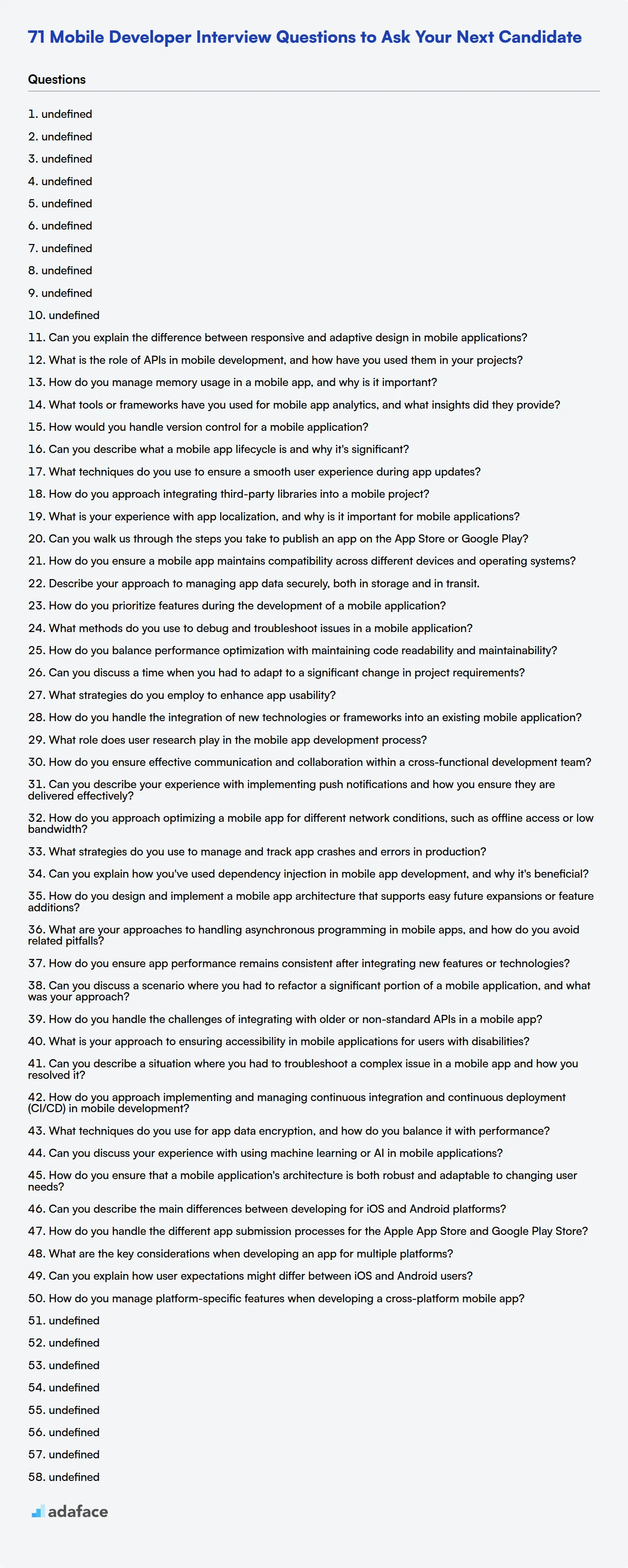Hiring the right mobile developer is crucial for building successful apps and staying competitive in the mobile-first world. Without a proper screening process, you might end up with subpar candidates who could slow down your projects and hurt your team's productivity.
This blog post provides a comprehensive list of mobile developer interview questions tailored for different experience levels. We cover basic, junior, intermediate, advanced, platform-specific, and situational questions to help you thoroughly evaluate candidates' skills and knowledge.
By using these questions, you can make more informed hiring decisions and build a stronger mobile development team. Consider pairing these interview questions with a pre-employment mobile developer assessment to get a complete picture of candidates' abilities.
Table of contents
10 basic Mobile Developer interview questions and answers to assess candidates
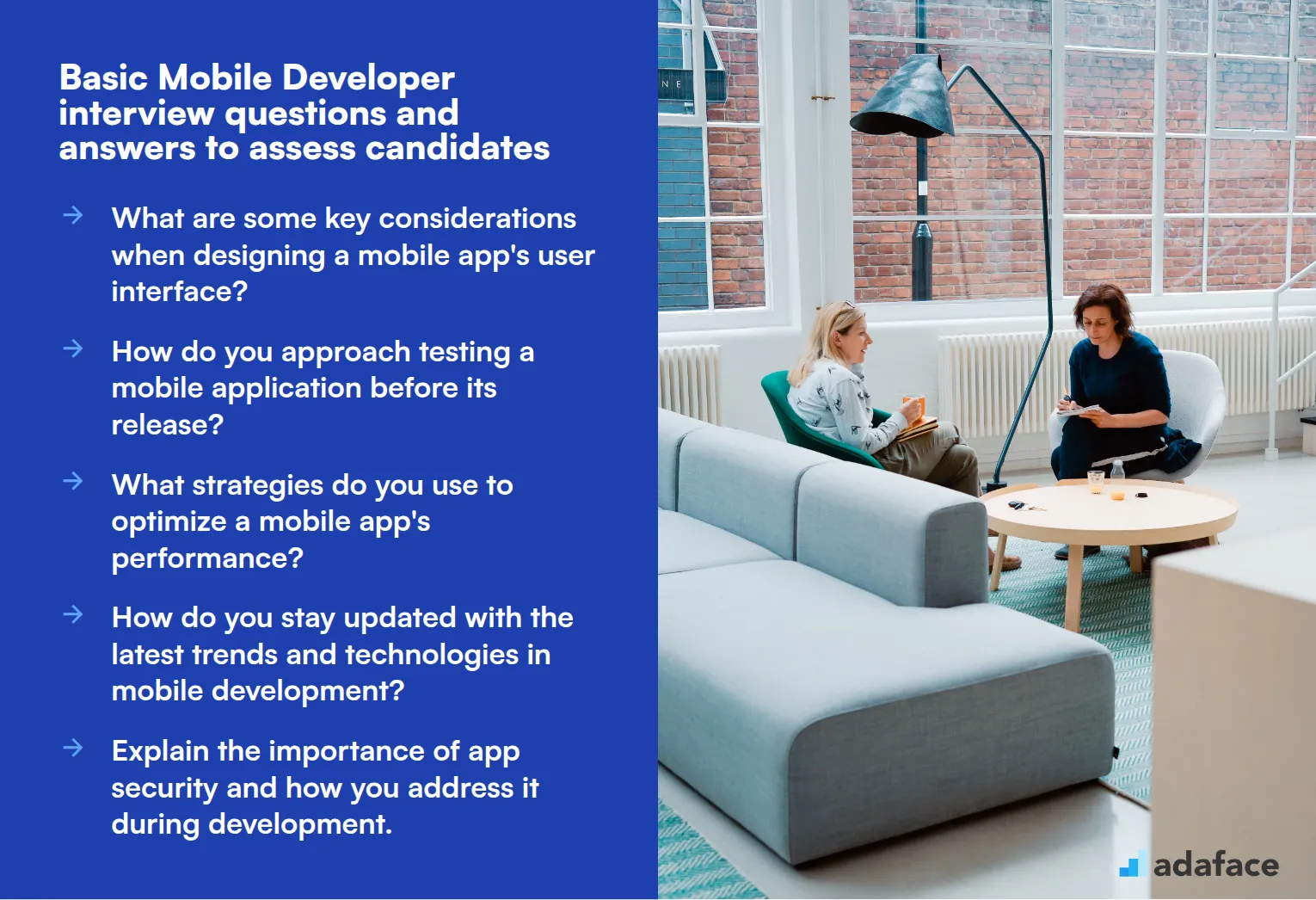
In the fast-paced world of mobile development, having a handy list of interview questions can make your hiring process smoother and more efficient. Whether you're looking for an iOS expert or an Android aficionado, these questions are designed to give you a clear insight into your candidate's skills and potential. Use them to identify the cream of the crop and ensure that your next hire is a perfect fit for your team.
1. What are some key considerations when designing a mobile app's user interface?
Designing a mobile app's user interface involves several key considerations, such as ensuring a seamless user experience, creating a visually appealing layout, and maintaining consistency across different devices.
Candidates should mention the importance of responsive design, intuitive navigation, and the use of familiar UI patterns to enhance usability. They may also discuss the need for accessibility features to cater to a diverse range of users.
An ideal response would highlight the candidate's understanding of balancing aesthetics with functionality and their awareness of the latest design trends. Follow-up questions could explore specific examples of past projects where they implemented these principles.
2. How do you approach testing a mobile application before its release?
Testing a mobile application is crucial to ensure its functionality, performance, and user experience. It involves various types of testing, such as unit testing, integration testing, and user acceptance testing.
Candidates might explain that they use both manual and automated testing methods to identify bugs and ensure the app performs well under different conditions. They should also mention the importance of testing on multiple devices and OS versions.
Look for candidates who demonstrate a thorough and systematic approach to testing. They should be able to provide examples of testing strategies they've implemented and discuss how they handle testing challenges.
3. What strategies do you use to optimize a mobile app's performance?
Optimizing a mobile app's performance involves various strategies, such as reducing app load time, minimizing resource usage, and improving overall responsiveness.
Candidates should discuss techniques like code optimization, efficient memory management, and leveraging caching strategies. They might also mention the use of performance monitoring tools to identify and fix bottlenecks.
An ideal candidate will be able to articulate how they've applied these strategies in past projects. They should be able to explain the impact of their optimizations on the app's performance and user satisfaction.
4. How do you stay updated with the latest trends and technologies in mobile development?
Staying updated with the latest trends and technologies is essential for a successful mobile developer. Candidates might mention subscribing to relevant blogs, attending industry conferences, or engaging in online communities.
Some candidates may also talk about taking online courses or participating in workshops to enhance their knowledge and skills. It's important for developers to be proactive in learning and adapting to new tools and frameworks.
Look for candidates who demonstrate a genuine passion for continuous learning. Their answer should reflect a proactive approach to staying informed about advancements in mobile development.
5. Explain the importance of app security and how you address it during development.
App security is critical to protect user data and ensure the integrity of the application. Developers should follow best practices to safeguard against vulnerabilities and potential breaches.
Candidates might mention techniques like data encryption, secure authentication methods, and regular security audits. They should also discuss the importance of staying informed about the latest security threats.
An ideal response will show the candidate's commitment to building secure applications. They should be able to provide examples of security measures they've implemented in previous projects.
6. How do you handle user feedback and incorporate it into future app updates?
User feedback is invaluable for improving an app and ensuring it meets user needs. Candidates should explain how they actively collect and analyze feedback to identify areas for improvement.
They might discuss using tools like surveys, app store reviews, and direct user interviews to gather insights. It's important to prioritize feedback based on the app's goals and the impact on user experience.
Look for candidates who demonstrate a user-centric approach. They should be able to describe how they've successfully used feedback to enhance app features and functionality in past projects.
7. What are some common challenges faced during mobile app development, and how do you overcome them?
Mobile app development presents several challenges, such as device fragmentation, performance optimization, and ensuring cross-platform compatibility.
Candidates should discuss their approach to tackling these challenges, such as using adaptive design, optimizing code for performance, and testing across multiple devices.
An effective response will showcase the candidate's problem-solving skills and ability to adapt to different scenarios. They should provide examples of challenges they've faced and how they've navigated them successfully.
8. Why is understanding the target audience important in mobile development?
Understanding the target audience is crucial for delivering a successful mobile app that meets user needs and preferences. It helps developers tailor features and design to enhance user satisfaction.
Candidates might mention conducting user research, creating user personas, and analyzing market trends to gain insights into the target audience's behavior and expectations.
An ideal candidate will emphasize the importance of aligning the app's features with user needs. They should be able to discuss how they've applied this understanding to create user-centric applications.
9. How do you ensure the scalability of a mobile application?
Ensuring scalability is essential for accommodating increasing user demands and ensuring a seamless user experience. Developers should design apps that can handle growth efficiently.
Candidates might discuss using modular architecture, optimizing backend services, and leveraging cloud resources to enhance scalability. They should also mention the importance of regular performance testing.
Look for candidates who can articulate their approach to building scalable applications. They should be able to provide examples of how they've prepared apps to handle increased load and user growth.
10. What factors do you consider when choosing between native and cross-platform development?
Choosing between native and cross-platform development depends on various factors, such as project requirements, budget, and target audience.
Candidates might mention that native development offers better performance and device-specific features, while cross-platform development provides faster time-to-market and cost-effectiveness.
An ideal response will demonstrate the candidate's ability to weigh the pros and cons based on specific project needs. They should provide examples of projects where they've chosen one approach over the other and the rationale behind their decision.
20 Mobile Developer interview questions to ask junior developers
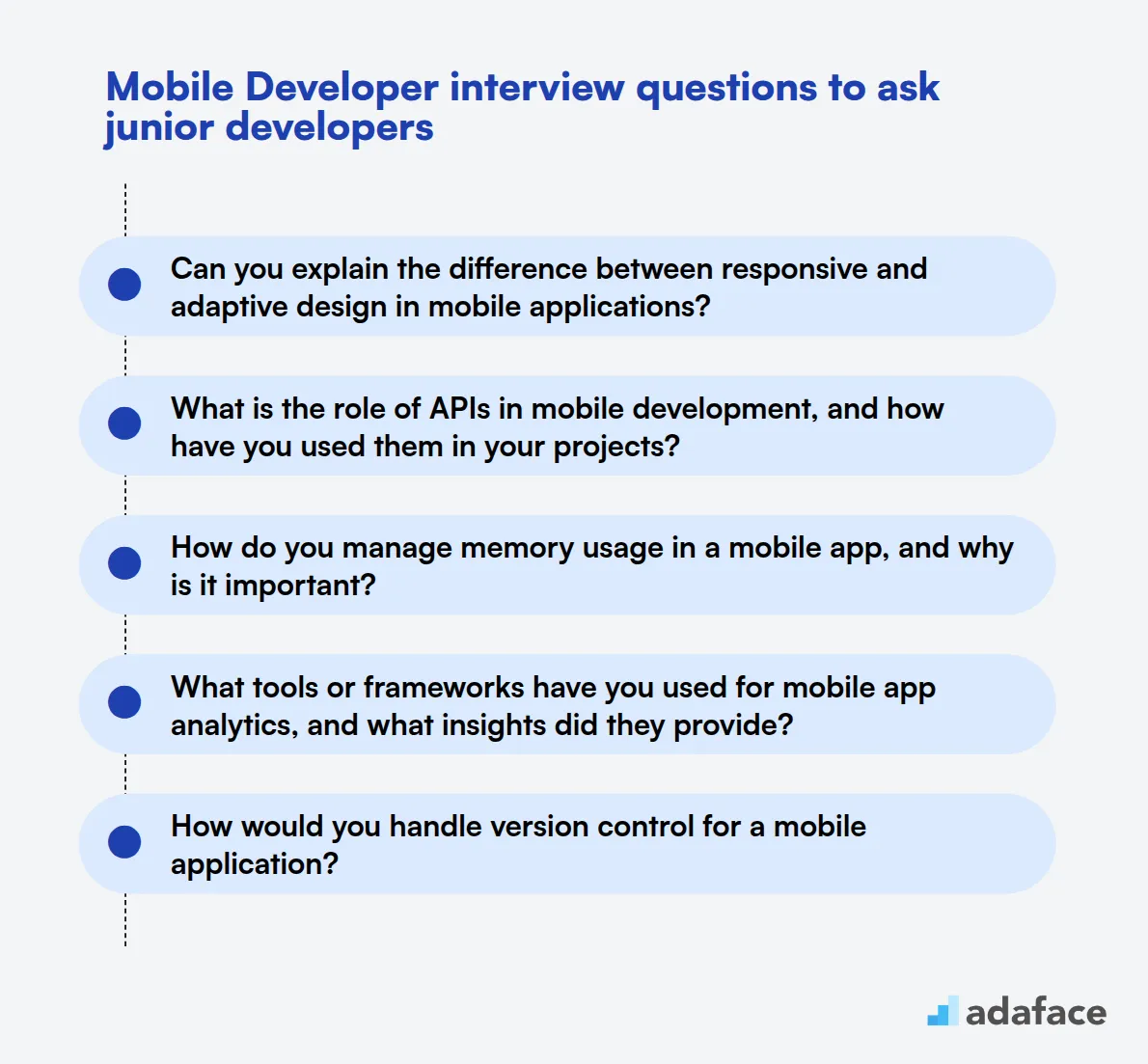
To gauge the foundational skills of junior mobile developers, utilize this list of targeted interview questions. These questions will help you assess their understanding of essential mobile development concepts and ensure they align with your team's goals. For more insights, consider reviewing the mobile developer job description.
- Can you explain the difference between responsive and adaptive design in mobile applications?
- What is the role of APIs in mobile development, and how have you used them in your projects?
- How do you manage memory usage in a mobile app, and why is it important?
- What tools or frameworks have you used for mobile app analytics, and what insights did they provide?
- How would you handle version control for a mobile application?
- Can you describe what a mobile app lifecycle is and why it's significant?
- What techniques do you use to ensure a smooth user experience during app updates?
- How do you approach integrating third-party libraries into a mobile project?
- What is your experience with app localization, and why is it important for mobile applications?
- Can you walk us through the steps you take to publish an app on the App Store or Google Play?
10 intermediate Mobile Developer interview questions and answers to ask mid-tier developers.
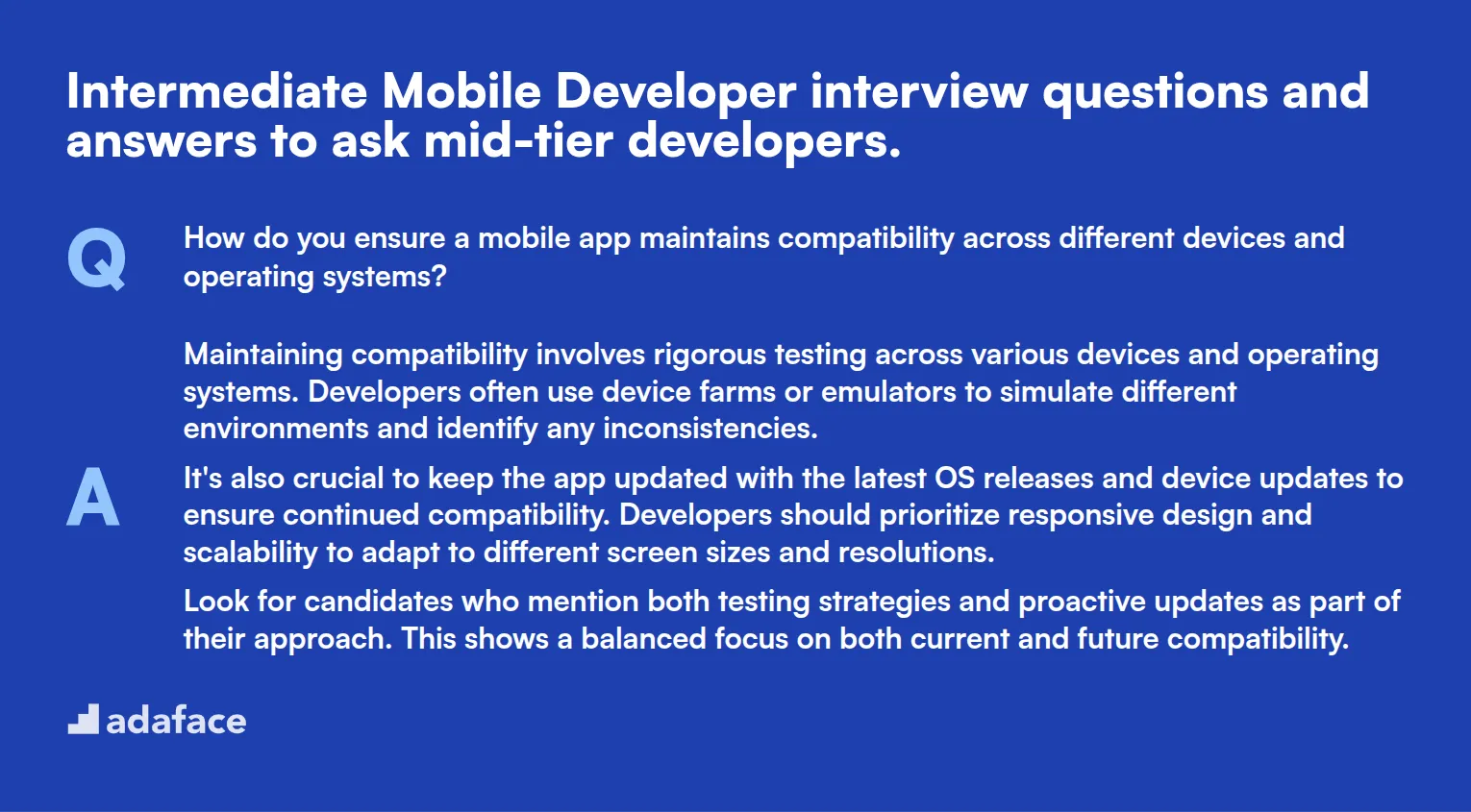
To effectively assess the prowess of your mid-tier mobile developer candidates, these interview questions are your go-to toolkit. Designed to explore intermediate concepts and practical understanding without diving too deep into technical jargon, they help you identify candidates who are ready to tackle real-world challenges with confidence.
1. How do you ensure a mobile app maintains compatibility across different devices and operating systems?
Maintaining compatibility involves rigorous testing across various devices and operating systems. Developers often use device farms or emulators to simulate different environments and identify any inconsistencies.
It's also crucial to keep the app updated with the latest OS releases and device updates to ensure continued compatibility. Developers should prioritize responsive design and scalability to adapt to different screen sizes and resolutions.
Look for candidates who mention both testing strategies and proactive updates as part of their approach. This shows a balanced focus on both current and future compatibility.
2. Describe your approach to managing app data securely, both in storage and in transit.
Data security is paramount, and developers should employ encryption for data both at rest and in transit. This means using secure protocols like HTTPS for data transmission and encrypting sensitive data stored on the device.
Additionally, developers should adhere to best practices such as implementing strong authentication mechanisms and regularly testing for vulnerabilities.
An ideal candidate will emphasize both encryption and authentication, demonstrating an understanding of comprehensive security measures.
3. How do you prioritize features during the development of a mobile application?
Prioritizing features often involves balancing user needs, business goals, and technical feasibility. Developers typically use frameworks like MoSCoW or agile methodologies to categorize features into must-haves, should-haves, could-haves, and won’t-haves.
User feedback and analytics play a critical role in this process, helping developers understand which features will deliver the most value and enhance user experience.
Look for candidates who mention a structured approach to feature prioritization, indicating their ability to align development efforts with strategic objectives.
4. What methods do you use to debug and troubleshoot issues in a mobile application?
Debugging often involves using tools like logcat for Android or Xcode's console for iOS to trace issues. Developers must systematically isolate and test different parts of the code to identify the root cause.
Collaborative debugging sessions with team members can also be invaluable, providing fresh perspectives and potential solutions.
Candidates who mention both individual and collaborative debugging approaches demonstrate a comprehensive strategy for tackling complex issues.
5. How do you balance performance optimization with maintaining code readability and maintainability?
Performance optimization should not compromise code quality. Developers should aim for clean, efficient code by following best practices and design patterns that enhance both performance and readability.
Code reviews and regular refactoring are essential to maintain code quality, ensuring that optimizations do not lead to technical debt.
An ideal answer will highlight the candidate's commitment to sustainable development practices, balancing short-term gains with long-term maintainability.
6. Can you discuss a time when you had to adapt to a significant change in project requirements?
Adapting to changing requirements is a common challenge in mobile development. Developers must remain flexible and use agile methodologies to accommodate changes without derailing the project timeline.
A specific example might involve reprioritizing the development backlog or redesigning a feature to align with new business goals.
Look for candidates who provide specific examples and demonstrate a proactive approach to managing change effectively.
7. What strategies do you employ to enhance app usability?
Enhancing usability involves understanding user behavior and designing intuitive interfaces. Developers should focus on creating consistent navigation patterns and minimizing user input to streamline interactions.
Regular usability testing with real users can provide valuable insights into areas for improvement, ensuring the app meets user expectations.
Candidates who emphasize user-centered design and testing demonstrate a strong commitment to delivering exceptional user experiences.
8. How do you handle the integration of new technologies or frameworks into an existing mobile application?
Integrating new technologies requires a thorough assessment of compatibility and potential impact on existing functionalities. Developers should conduct proof-of-concept tests and phased rollouts to mitigate risks.
Documentation and training are also important to ensure the development team fully understands and can utilize the new technologies effectively.
Candidates who mention careful planning and team enablement show foresight in managing technological transitions smoothly.
9. What role does user research play in the mobile app development process?
User research is critical to understanding user needs and behaviors, informing design decisions, and validating assumptions. It can involve surveys, interviews, and usability testing to gather insights.
This research helps developers create apps that are not only functional but also enjoyable and engaging for users.
Strong candidates will highlight how user research influences their development process, prioritizing user needs and iterative feedback.
10. How do you ensure effective communication and collaboration within a cross-functional development team?
Effective communication often involves using collaboration tools like Slack or Asana and holding regular meetings to align team members on project goals and progress.
Developers should also be open to feedback and actively participate in discussions to foster a collaborative environment.
Look for candidates who demonstrate a proactive approach to communication, ensuring all team members are engaged and informed.
15 advanced Mobile Developer interview questions to ask senior developers
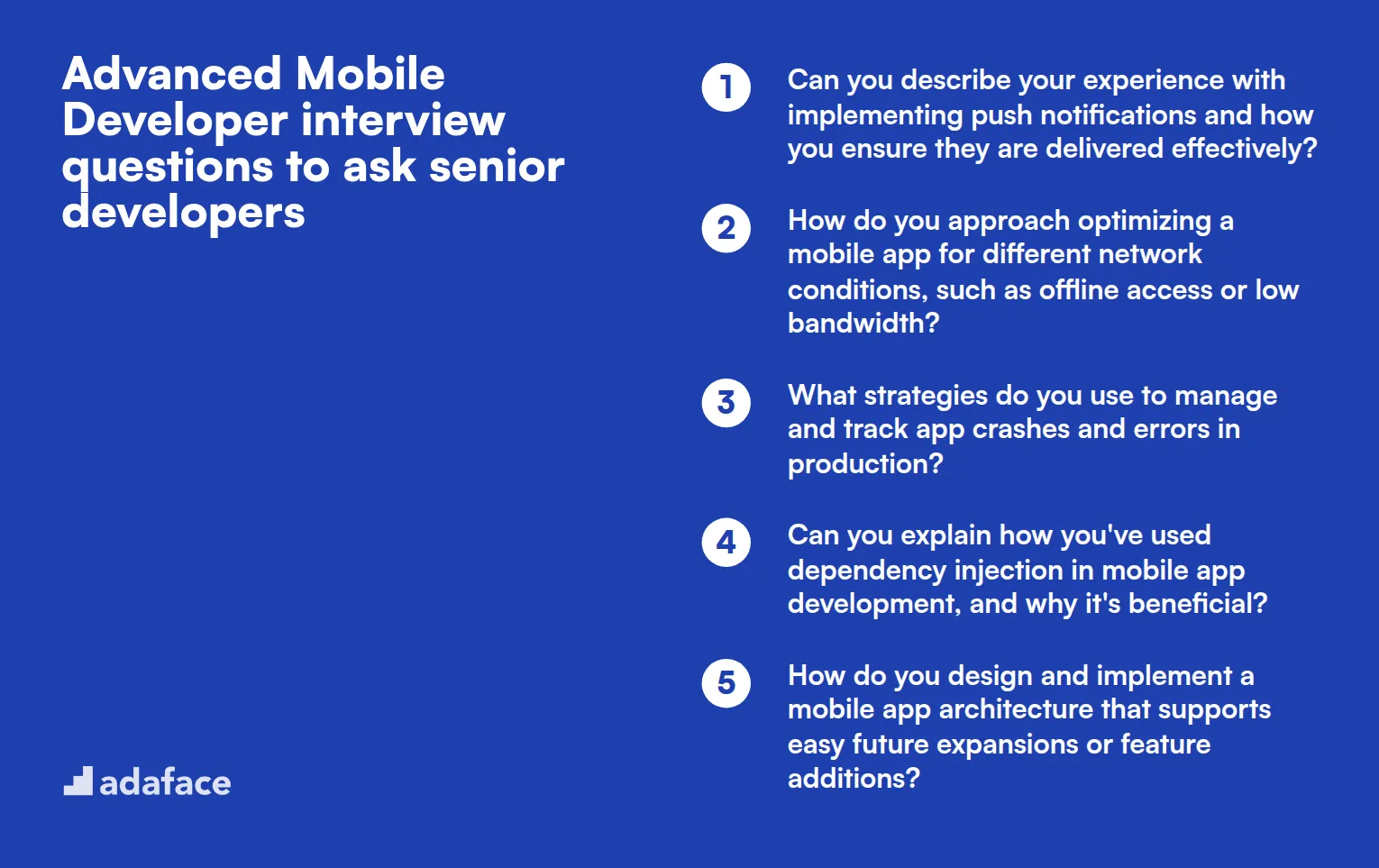
When interviewing senior mobile developers, it's crucial to dive deeper into their expertise and problem-solving abilities. These advanced questions will help you assess candidates' technical proficiency and their ability to handle complex challenges in mobile development. For more insights on hiring, check out our mobile developer job description.
- Can you describe your experience with implementing push notifications and how you ensure they are delivered effectively?
- How do you approach optimizing a mobile app for different network conditions, such as offline access or low bandwidth?
- What strategies do you use to manage and track app crashes and errors in production?
- Can you explain how you've used dependency injection in mobile app development, and why it's beneficial?
- How do you design and implement a mobile app architecture that supports easy future expansions or feature additions?
- What are your approaches to handling asynchronous programming in mobile apps, and how do you avoid related pitfalls?
- How do you ensure app performance remains consistent after integrating new features or technologies?
- Can you discuss a scenario where you had to refactor a significant portion of a mobile application, and what was your approach?
- How do you handle the challenges of integrating with older or non-standard APIs in a mobile app?
- What is your approach to ensuring accessibility in mobile applications for users with disabilities?
- Can you describe a situation where you had to troubleshoot a complex issue in a mobile app and how you resolved it?
- How do you approach implementing and managing continuous integration and continuous deployment (CI/CD) in mobile development?
- What techniques do you use for app data encryption, and how do you balance it with performance?
- Can you discuss your experience with using machine learning or AI in mobile applications?
- How do you ensure that a mobile application's architecture is both robust and adaptable to changing user needs?
8 Mobile Developer interview questions and answers related to platform differences
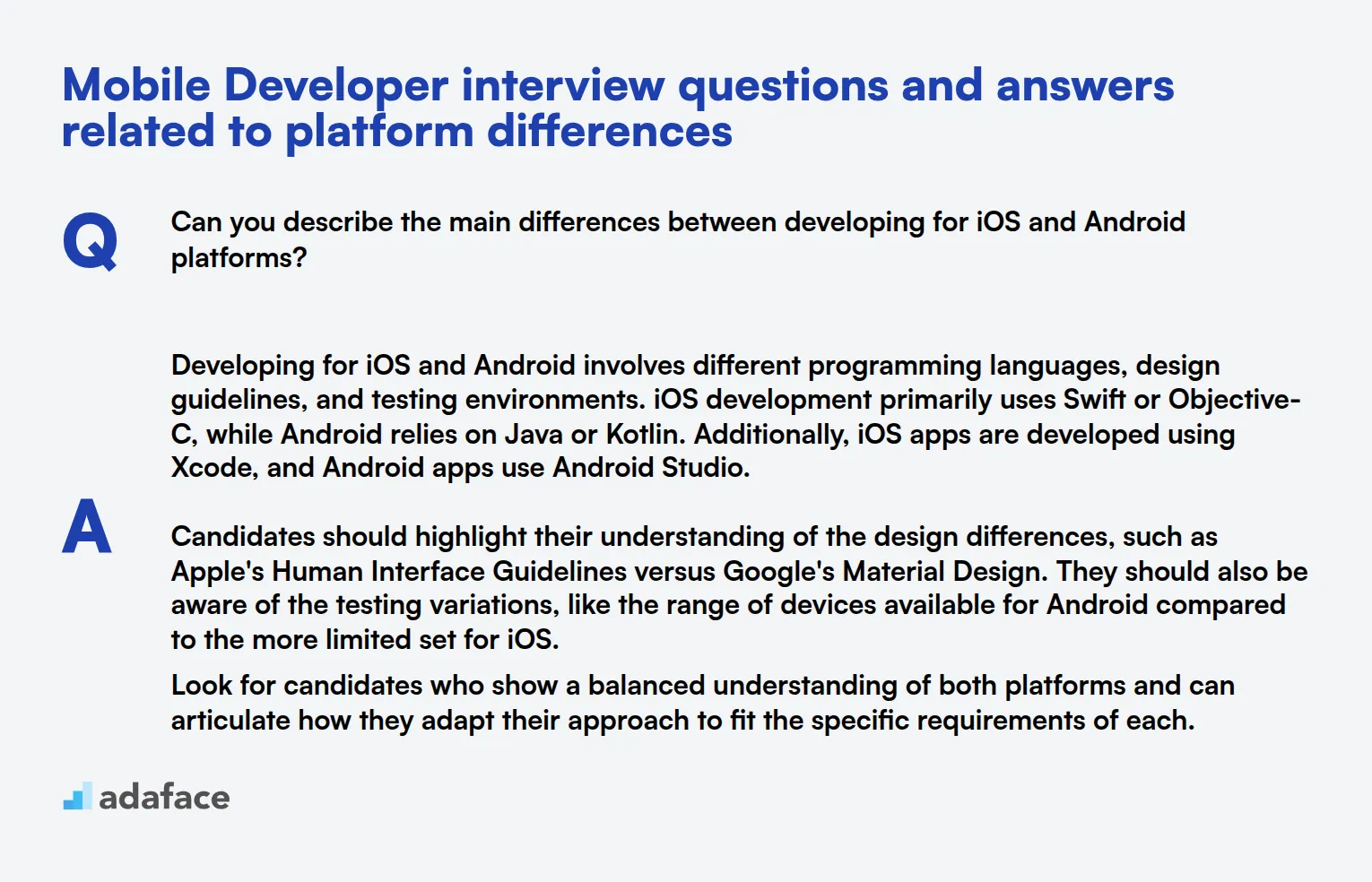
Navigating the maze of platform differences can be a head-scratcher for mobile developers. To help demystify this, we've compiled a list of interview questions that will help you identify candidates who can seamlessly switch between platforms without breaking a sweat. Use these questions to ensure your candidates can handle the nuances of various mobile platforms.
1. Can you describe the main differences between developing for iOS and Android platforms?
Developing for iOS and Android involves different programming languages, design guidelines, and testing environments. iOS development primarily uses Swift or Objective-C, while Android relies on Java or Kotlin. Additionally, iOS apps are developed using Xcode, and Android apps use Android Studio.
Candidates should highlight their understanding of the design differences, such as Apple's Human Interface Guidelines versus Google's Material Design. They should also be aware of the testing variations, like the range of devices available for Android compared to the more limited set for iOS.
Look for candidates who show a balanced understanding of both platforms and can articulate how they adapt their approach to fit the specific requirements of each.
2. How do you handle the different app submission processes for the Apple App Store and Google Play Store?
The app submission process for the Apple App Store is typically more rigorous, with a detailed review process that can take several days. This involves adhering to strict guidelines and providing extensive app information. In contrast, Google Play Store submissions are generally quicker and more straightforward, focusing on automated checks.
A candidate should mention the importance of following platform-specific guidelines to ensure a smooth approval process. They might also discuss testing strategies that help them meet these requirements.
An ideal candidate will demonstrate a thorough understanding of both processes and explain how they manage timelines and expectations during app submission.
3. What are the key considerations when developing an app for multiple platforms?
When developing for multiple platforms, it's crucial to maintain consistency in user experience across devices while accounting for platform-specific functionalities. This involves using cross-platform development tools like React Native or Flutter, which allow developers to write code that can be shared across platforms.
Candidates should be aware of the trade-offs involved, such as potential performance compromises and the necessity to tailor certain features to fit each platform.
Look for candidates who can articulate a clear strategy for balancing shared codebases with platform-specific customizations, ensuring both efficiency and a quality user experience.
4. Can you explain how user expectations might differ between iOS and Android users?
iOS users often expect a more polished and consistent experience, aligning with Apple's focus on design and performance. In contrast, Android users might prioritize customization and flexibility due to the diverse range of devices available.
Candidates should mention how this impacts their design and development choices, perhaps focusing on how they might adjust the interface or features to meet these differing expectations.
Seek candidates who can demonstrate empathy for the end user and adapt their development approach to align with varying user expectations across platforms.
5. How do you manage platform-specific features when developing a cross-platform mobile app?
Managing platform-specific features in a cross-platform app involves identifying which features need to be customized for each platform and which can be standardized. This often requires using conditional logic to implement platform-specific code where necessary.
Candidates should explain their approach to testing, ensuring that both shared and platform-specific features perform well on all devices.
Ideal candidates will exhibit a methodical approach to isolating platform-specific code, reducing complexity, and maintaining a cohesive user experience across platforms.
8 situational Mobile Developer interview questions with answers for hiring top developers
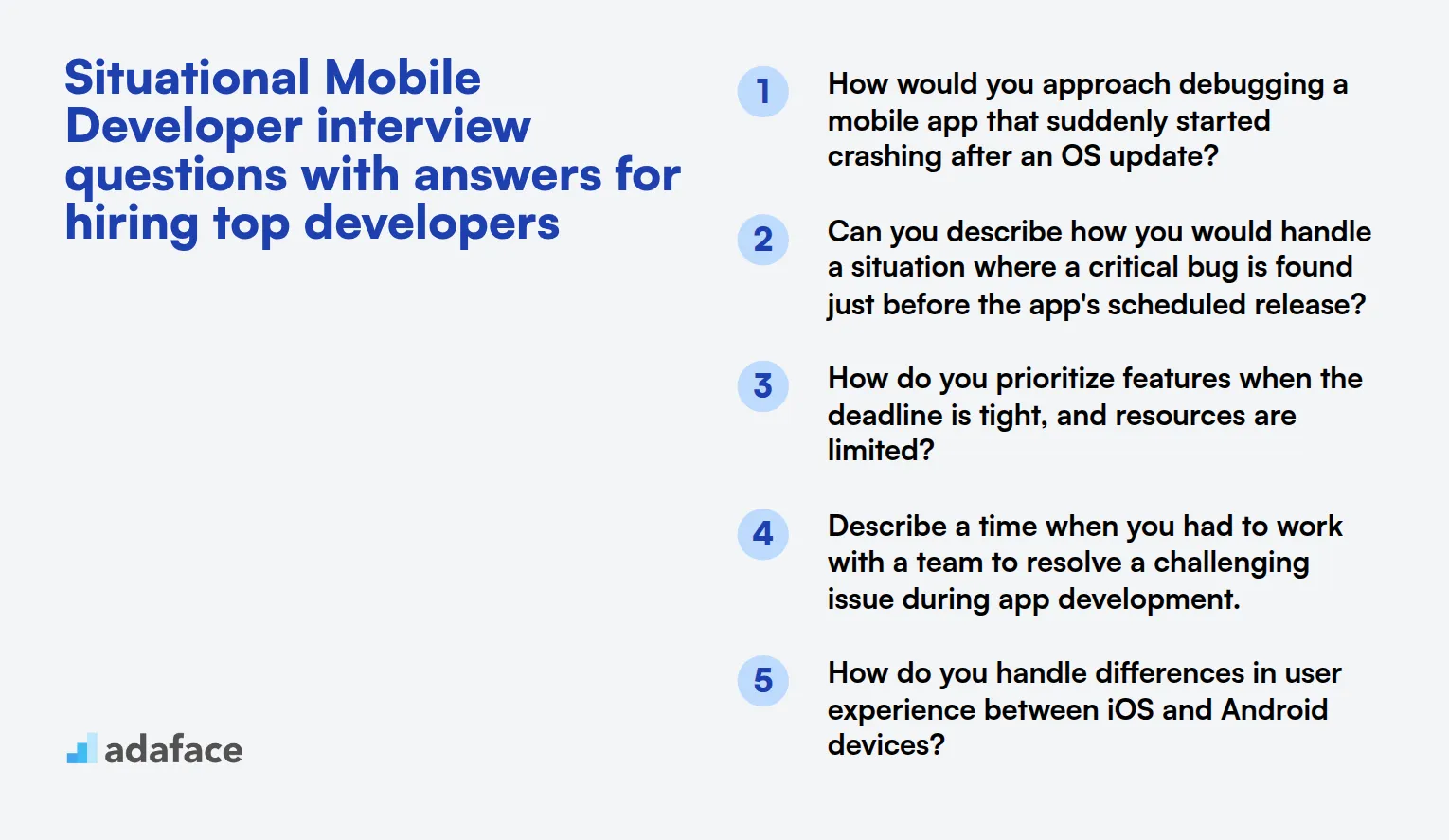
When it comes to hiring mobile developers, situational interview questions can be your secret weapon. These questions not only reveal how candidates think and react in real-world scenarios but also help you assess their problem-solving skills, adaptability, and creativity. Use this list of questions to unearth the true potential of your applicants and ensure they are a perfect fit for your team.
1. How would you approach debugging a mobile app that suddenly started crashing after an OS update?
A candidate should initially confirm the issue by replicating the crash on their device or emulator. They might mention checking the crash logs to identify any unusual patterns or errors that may be linked to the OS update.
Once the issue is identified, they would likely mention updating dependencies or libraries that might be causing incompatibility issues. The candidate may also discuss testing the app on different devices and OS versions to ensure stability across platforms.
Look for candidates who demonstrate a methodical approach to problem-solving, as well as an awareness of how OS updates might affect app performance. Their response should reflect a structured plan that includes verification, analysis, and testing.
2. Can you describe how you would handle a situation where a critical bug is found just before the app's scheduled release?
Candidates might start by emphasizing the importance of assessing the bug's impact and determining whether it affects app functionality, user data, or security. They should highlight the necessity of communicating with the team to decide on a course of action.
They might propose actions such as delaying the release, releasing a quick fix, or informing users about the bug with a plan for resolution. Additionally, they should describe the importance of conducting a thorough root cause analysis to prevent future occurrences.
An ideal candidate will display strong communication and decision-making skills. Their response should reflect a balance between technical proficiency and the ability to work collaboratively with the team under pressure.
3. How do you prioritize features when the deadline is tight, and resources are limited?
A candidate may begin by discussing the necessity of understanding the app's core value proposition and user needs. They might talk about engaging with stakeholders to ensure alignment on which features provide the most value to users.
They could suggest using a prioritization framework like MoSCoW (Must have, Should have, Could have, Won't have) to categorize features based on urgency and importance.
The interviewer should look for responses that demonstrate the candidate's ability to make strategic decisions and collaborate with stakeholders while being mindful of both time and resource constraints.
4. Describe a time when you had to work with a team to resolve a challenging issue during app development.
Candidates should outline a specific scenario where they encountered a significant challenge. They might describe their role in the team and how they contributed to identifying the root cause of the issue.
They should explain the steps they took as a team, such as brainstorming solutions, delegating tasks, and implementing fixes. Highlighting how they ensured clear communication and maintained team morale is important.
A strong candidate will provide a detailed account of their collaborative problem-solving skills. Their response should reflect their ability to work effectively within a team, showing how they leveraged collective expertise to overcome hurdles.
5. How do you handle differences in user experience between iOS and Android devices?
Candidates might begin by discussing the importance of understanding the design guidelines and user expectations for each platform. They should talk about the necessity of creating a seamless and intuitive experience tailored to both iOS and Android users.
They may mention adapting the UI components to align with platform-specific interactions, gestures, and animations. They might also discuss testing on multiple devices to ensure consistency and usability.
Look for candidates who demonstrate a deep understanding of platform-specific nuances and a commitment to delivering a high-quality user experience across devices. Their response should indicate their ability to adapt and innovate to meet diverse user needs.
6. What steps do you take to ensure that a mobile app is accessible to all users, including those with disabilities?
Candidates should first emphasize the importance of designing apps with accessibility in mind from the start. They might mention incorporating features like voice commands, screen readers, and customizable text sizes to cater to diverse user needs.
They could discuss conducting accessibility testing with tools and actual users who have disabilities to ensure the app meets accessibility standards. Additionally, they might highlight the importance of adhering to guidelines such as WCAG (Web Content Accessibility Guidelines).
An ideal candidate will show a strong commitment to inclusivity and accessibility. Their response should reflect a proactive and comprehensive approach to making apps usable for everyone, regardless of their abilities.
7. How would you approach integrating a new third-party service into an existing mobile app?
Candidates might start by discussing the importance of thoroughly evaluating the third-party service to ensure compatibility and reliability. They should mention reviewing the service's documentation and API specifications to understand its capabilities and limitations.
They could describe testing the integration in a development environment before deploying it to production. Emphasizing the need for thorough testing to ensure the new service does not disrupt existing functionalities is crucial.
The interviewer should look for candidates who display a methodical and cautious approach to integration. Their response should showcase their attention to detail and ability to anticipate and mitigate potential issues during the integration process.
8. Can you describe a scenario where you had to make a difficult trade-off between app performance and feature richness?
A candidate may begin by describing a specific instance where they needed to decide between maintaining a high-performing app and adding more features. They might explain the factors they considered, such as user feedback, performance metrics, and project timelines.
They could detail their decision-making process, perhaps prioritizing essential features that enhance user experience while deferring non-critical additions. They might also discuss optimizing existing features to maintain app performance.
Look for candidates who demonstrate critical thinking and strategic decision-making. Their response should reflect an understanding of the balance between performance and feature set, showing how they can make informed decisions based on user needs and technical constraints.
Which Mobile Developer skills should you evaluate during the interview phase?
In the mobile development landscape, it's challenging to assess every aspect of a candidate's expertise during a single interview. However, focusing on core skills can provide a solid basis for evaluating a candidate's suitability. The following skills are vital for any mobile developer role and should be prioritized during your interview process.
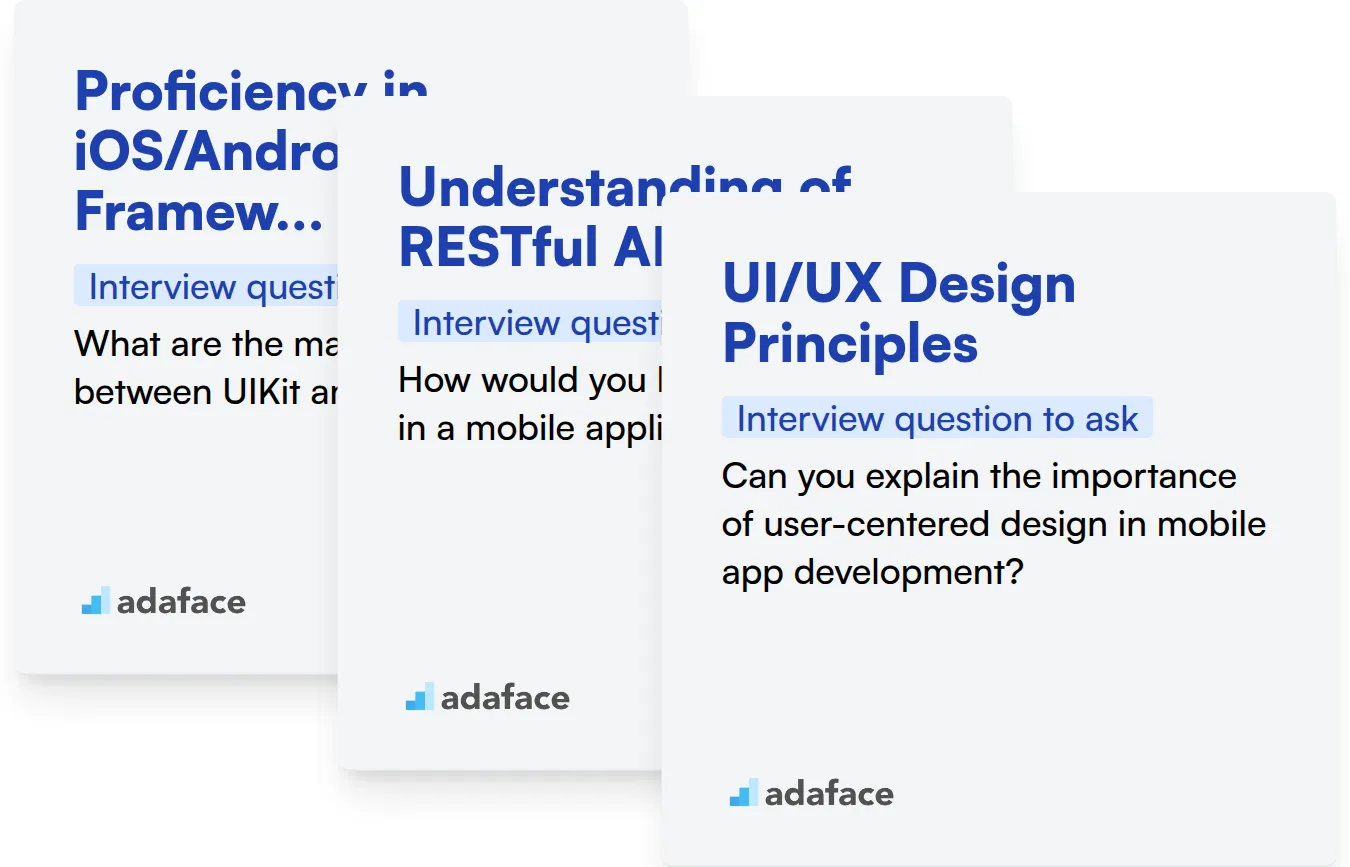
Proficiency in iOS/Android Frameworks
To assess this skill, you can use an assessment test that includes multiple-choice questions on iOS or Android frameworks. For example, you might consider the Android Test or the iOS Test from our library.
Additionally, asking targeted interview questions can help you further evaluate their expertise in these frameworks.
What are the main differences between UIKit and SwiftUI?
Look for an understanding of both frameworks and their specific use cases. A candidate should be able to explain the advantages and scenarios where one might be preferred over the other.
Understanding of RESTful APIs
To gauge their knowledge in this area, consider using an assessment test to filter out candidates based on their understanding of RESTful APIs through relevant multiple-choice questions. Unfortunately, there isn't a specific test for this in our library.
In your interview, you can ask a focused question regarding RESTful API integration.
How would you handle API errors in a mobile application?
Listen for responses that highlight strategies for error handling, such as using appropriate user feedback or implementing retry logic in their applications.
UI/UX Design Principles
Although we do not have a specific test for UI/UX principles, an assessment incorporating design-related questions could be beneficial for filtering candidates.
Moreover, it's helpful to ask about their design philosophy during the interview.
Can you explain the importance of user-centered design in mobile app development?
A good answer should demonstrate an appreciation for user needs and how design decisions impact usability and satisfaction.
3 Tips for Using Mobile Developer Interview Questions
Before you dive into conducting interviews, here are some tips to make the most out of your Mobile Developer interview process.
1. Integrate Skills Tests Into Your Interview Process
Skill tests are a great way to screen candidates before the interview stage. They provide a preliminary measure of a candidate's competency and can help narrow down your pool of applicants.
Consider using tests tailored to specific mobile development skills. For Android, the Android Online Test can be effective, while iOS skills can be assessed using the iOS Online Test. For cross-platform development, the React Native Online Test is a good choice.
Incorporating these tests early on can help ensure only the most qualified candidates move forward in the hiring process. This paves the way for more insightful interviews.
2. Compile a Targeted List of Interview Questions
Time is limited during interviews, so choosing a focused set of questions is key. Select questions that cover the most critical skills and aspects for the role you're hiring for.
In addition to technical questions, consider including questions related to other competencies, like problem-solving or communication. You can find more interview questions for related skills in our library, such as those on HTML5 or JavaScript.
With a well-rounded question set, you can evaluate candidates more effectively and make informed hiring decisions.
3. Don’t Forget to Ask Follow-Up Questions
Asking follow-up questions is crucial to getting a deeper understanding of a candidate's expertise. It helps uncover whether a candidate's knowledge aligns with the needs of the role.
For example, if a candidate answers a question about mobile app optimization strategies, a good follow-up could be, 'Can you provide an example of how you have improved app performance in the past?' This helps gauge their practical experience and ability to apply their knowledge.
Use Mobile Developer interview questions and skills tests to hire talented developers
When hiring for a Mobile Developer role, it's important to ensure candidates possess the necessary skills. The best way to assess these skills is through targeted skill tests. Consider using tests like the Mobile Developer Test or platform-specific assessments such as the iOS Online Test to get precise insights.
Once you've used these tests to shortlist the best candidates, invite them for interviews. To proceed, you can sign up on our platform here and explore our online assessment platform for more options.
Mobile Developer Test
Download Mobile Developer interview questions template in multiple formats
Mobile Developer Interview Questions FAQs
A Mobile Developer should have skills in programming languages like Java, Swift, or Kotlin, understanding of mobile UI/UX design, and knowledge of APIs and libraries.
Ask situational questions or give them a coding challenge related to common mobile development issues to see their approach and solutions.
Look for foundational programming skills, eagerness to learn, and a basic understanding of mobile development concepts.
Platform-specific questions help determine the candidate's expertise with the specific operating system and tools they will be working with.
Inquire about their past projects where they have optimized apps for performance, battery life, and resource management.
Ask about a time they had to learn a new technology quickly and how they adapted to changes in project requirements.

40 min skill tests.
No trick questions.
Accurate shortlisting.
We make it easy for you to find the best candidates in your pipeline with a 40 min skills test.
Try for freeRelated posts
Free resources




